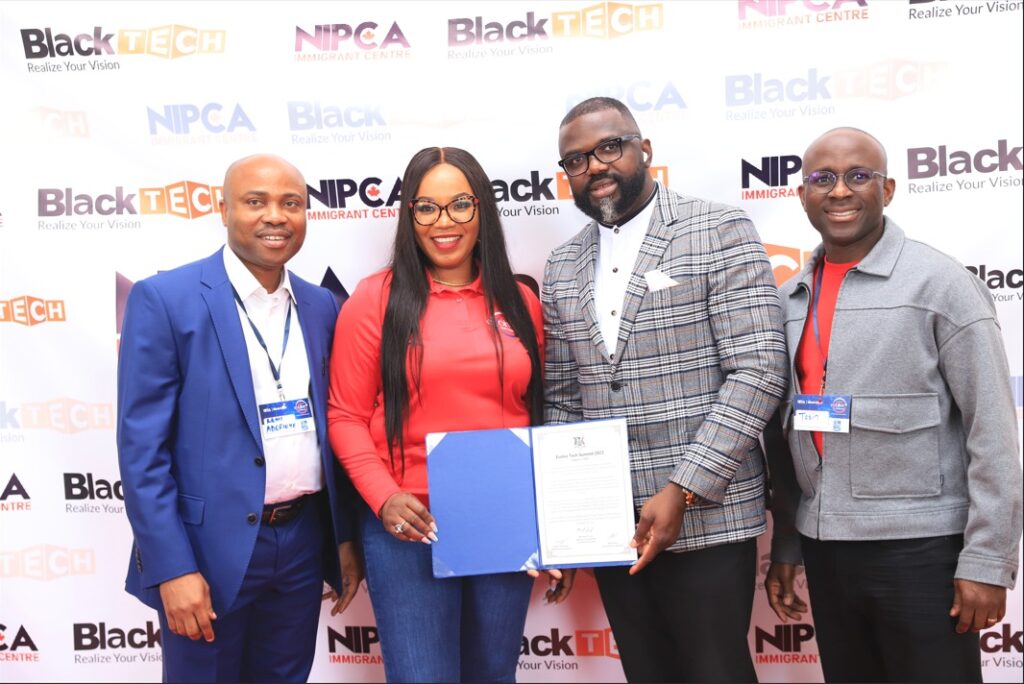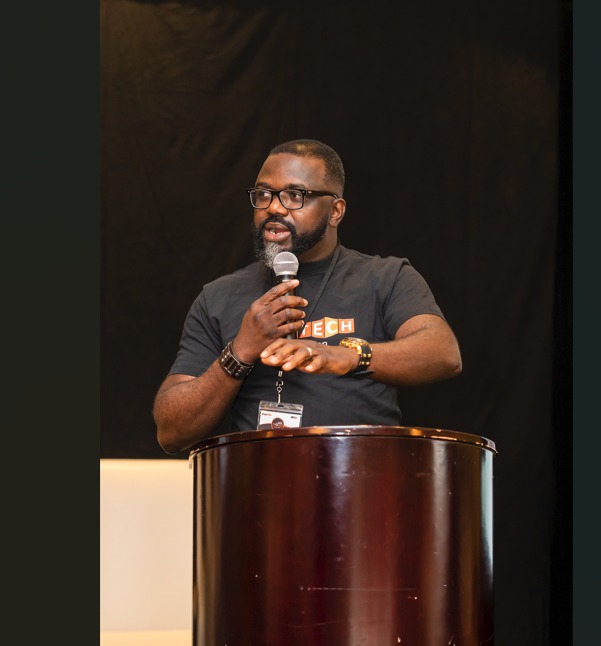— Nwajiufor, Nigerian Canadian Techpreneur, reveals

The life of the average new immigrant to major destinations like the USA, Canada, the UK, and Europe is often laced with diverse intricacies. However complex, the need to land a well-paying job remains top on the list. The fact that degrees obtained in Nigeria are not rated as equivalent to those in these countries has been a major setback for new immigrants.
A situation where a medical doctor takes up the job of a construction site laborer or a lawyer works as a security guard leaves much to be desired. Challenges like these have troubled many newcomers and made them disillusioned. This was also the case for Mr. Osita Nwajiufor, one of Nigeria’s foremost Canada-based techpreneurs.
In 2017, courtesy of the Express Entry pathway, he relocated with his family to Canada. Getting a befitting job became his greatest challenge. When he looked around with no help in sight, he embraced the idiomatic expression, ‘When life gives you lemons, make lemonade.’ Like a soldier on the war front, Osita took the audacious initiative, drawing from his primary field—tech.
Today, Osita Nwajiufor is leading and mentoring a generation of Nigerian and other immigrant professionals thriving in the tech space in Canada and beyond.
In an exclusive interview with Diaspora Newsline’s Frankwhite Nzeh, this Anambra State-born tech enthusiast, who presently wears several hats—Founder/CEO of BlackTech Academy, BlackTech Hub, VP/Co-founder of ExpertEdge Consulting Group, Founder/President of Nigerian IT Professionals in Canada (NIPCA), and a member of the Forbes Business Council—shared his thoughts, experiences, vision, and mission. Most importantly, he revealed how he and his team are performing economic miracles in Canada. It is quite revealing. Enjoy!
- What is the vision and mission behind some of the entities you represent?
“The vision behind some of these entities that I represent is basically that of impact. I have been in the tech space for over 25 years, covering various aspects—from business analysis to cybersecurity, management consulting, and oil and gas. I was the Group Head of IT for a multi-billion-dollar oil and gas firm in Nigeria before I decided in 2017 to call Canada our new home.
Arriving in Canada, we faced the challenges that confront every new immigrant. The first thing that came to my mind was: What can we do differently? Seeing master’s degree holders doing minimum-wage jobs, menial jobs—so many of them unemployed or underemployed—broke my heart. That was when we set things in motion to empower new immigrants with the right skills.
As of today, over 15,000 people have gone through our training. We have also entered into strategic partnerships with government and non-government institutions, all geared toward internships, job placements, and ensuring our people get the kind of jobs they deserve.”

- On the NIPCA Initiative?
For the purpose of solving some of the problems new immigrant professionals face in Canada, after speaking with many people, I decided to take the initiative of assembling like-minded individuals. I started by setting up a community, and since my professional background is in IT, that was the natural best bet.
We began by offering resume support, interview coaching, mentorship, and tech training—all for free. The community continued to grow, and today, we have over 5,000 Nigerians across Canada, from coast to coast. It was about creating the right community where people can come together to support each other. The government cannot do everything for you.”
- On the Difference Between NIPCA, BlackTech Hub, BlackTech Academy,
and ExpertEdge Consulting?
“NIPCA focuses on Nigerians in IT. It is aimed at providing job support, mentorship, training, resume reviews, interview coaching, etc.—all geared towards building a strong community of IT professionals for mutual benefit.
Then, the BlackTech Hub is broader—it includes everyone, regardless of race. Whether you are white, black, or from any other background, as long as you are a tech professional, you are welcome. While NIPCA is strictly for Nigerians, the BlackTech Hub was created due to increasing demand from non-Nigerians who attended our masterclasses and wanted to participate. So, we designed BlackTech Hub as a bigger, global organization, whereas NIPCA is restricted to Canada. Both are nonprofit organizations catering to the interests of IT professionals.
Next, we have the BlackTech Academy, which focuses on work-integrated training, placements,internships, and corporate training. The primary goal is to equip immigrants with the right tech skills—not just Black people, but anyone looking to enter the tech space. Our focus is on providing the right mentorship, knowledge, and experience to help them launch their careers.
Finally, there’s ExpertEdge Consulting Group, which is our consulting arm. It has over 30 consultants working under it. When you think of ExpertEdge, think of Deloitte. Like Deloitte, we offer consulting, project management, cybersecurity awareness training, cybersecurity maturity assessments, vulnerability assessments, risk assessments, digital transformation projects—you name it.
Through this structure, we’ve created a pipeline where students from BlackTech Academy gain
real-world job experience at ExpertEdge. Imagine completing a program with BlackTech
Academy and then getting absorbed by ExpertEdge to work on real-life projects for our clients.
This solves a major challenge for newcomers who often face discrimination due to a ‘lack of Canadian experience.’ With opportunities like this on your resume, you become immediately employable. That’s how the four entities are integrated.”
- What is the shortest possible duration to train a non-tech professional for
employability?
“Our programs are professional, and you don’t have to be a university graduate—high school completion is enough to enlist. Right now, we have an ongoing partnership with the Ontario government to train Black youth in data analytics and job placements.
Generally, all our programs focus on immigrants interested in transitioning into tech. They are beginner-friendly, starting from ground zero. Some programs take six months, while others are three and a half months. We run about 13 different programs, and after the training, we provide ongoing support. Every time you have an interview, our team is there to assist with resume revamps and interview preparation.
It’s more than just a training program; it’s a community focused on the economic empowerment of its members.”

- Can someone without an IT background become employable in Tech in
just 3 1/2 months?
“Yes, it’s possible—especially if the person is highly motivated. It’s not magic. If you check our website, you’ll see testimonials from alumni. Every single month, we record at least 15 job offers
in the BlackTech ecosystem. And these aren’t just ordinary jobs—we’re talking six-figure salaries.
Tech is the future, that is where the money is. Every organization wants to migrate to digital platforms, cloud computing,
cybersecurity, and project management. That’s where the money is right now. Some of our alumni are making $300k+ while working remotely.
But to succeed, you must embody three qualities:
1. Commitment – You have to be dedicated. It’s not a 31/2-month program where you quit after two weeks.
2. Resourcefulness – Everything in tech requires problem-solving. If you get stuck, do you give up, or do you keep trying until you find a solution?
3. Resilience – Sometimes, the journey gets tough. But do you give up and return to a minimum-wage job, or do you push through?
We call this the ‘CRR’ approach—Commitment, Resourcefulness, and Resilience. That’s the mindset needed to succeed in tech.”
- How has the journey been personally?
“So far, so good. Looking back, especially at the impact we’ve made on immigrants, I feel fulfilled.
The beginning wasn’t easy. During the formative stage of NIPCA, some people discouraged me.
They said Nigerians could never be united. But I was not deterred. I made membership completely free because I knew many Nigerians had a phobia for dues. I funded everything myself initially.
People saw something different—they saw value. I am a value-driven person.
I’ve also been blessed with the right team, the right partnerships. One man alone couldn’t have done this. But I thank God, especially for the lives that have been transformed.
There’s nothing like receiving a call from someone saying, ‘I just got a job offer. I’ve been in Canada for over a year without a job, but after going through BlackTech, I now earn $140k.’
That is what we call an economic miracle. If you have a spiritual need, you go to church or a mosque. But here, we create economic miracles. If you were unemployed or stuck in a minimum-wage job and now earn 3–4 times more, what greater miracle is there?
One person told me, ‘Osita, I haven’t taken a vacation in my three years in Canada. But for the first time, my husband and I are planning a vacation with our kids.’
That’s what economic empowerment does. When your paycheck can’t even take you home, how do you plan a vacation? That’s why I do what I do.”
- On your membership of Forbes Business Council?
“I was surprised when Forbes reached out to me in 2023. Based on our work, we received recommendations, and they conducted interviews before inviting me to join.
Now, I participate in monthly thought leadership sessions where professionals, founders, and CEOs brainstorm on global issues.
I am particularly passionate about topics related to Black professionals, about DEI (diversity, equity, inclusivity), and tech. It has been a worthwhile engagement—meeting thought leaders, sharing insights, and expanding networks globally.”
- Your thoughts on Brain Drain in Nigeria?
“Brain drain will continue, and I don’t think it should be a problem for Nigeria. With over 200 million people, how many actually have the economic capacity to leave?
Some people leave, but many remain unemployed back home. So, brain drain isn’t the real issue.
The key is for those who leave to give back. Through exchange programs, training, and mentorship, they can uplift Nigeria. For example, BlackTech is already working on several pro bono initiatives to help organizations in Nigeria build capacity.
We should never forget home. But no one should worry about brain drain—it will continue.”
- What If Nigeria Loses Its Best Hands to Brain Drain?
“Who says those leaving are the ‘best hands’? They are simply the privileged few.
As long as they remember home, it’s not a loss.”
- Where in Nigeria are you from and would you serve Nigeria if called upon?
“I am from Anambra State, and I would be willing to serve Nigeria in any capacity
But not at the moment. The level of insecurity is too high, and I have no plans for such travels now—unless it’s something I can do remotely.”
- Thank you for your time sir
“Thank you for having me”
note! The zoom video version will be live on all Diaspora Newsline online video channels
